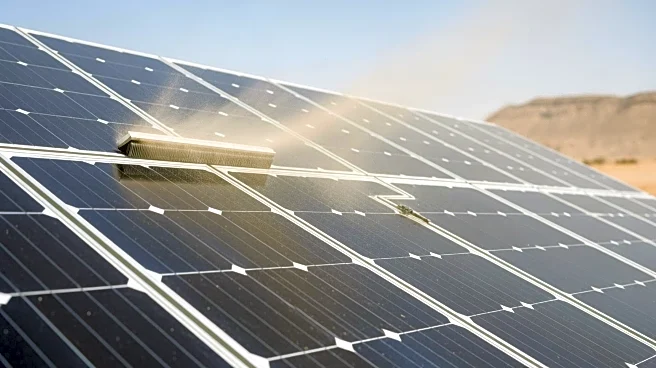What's Happening?
Egyptian scientists have introduced innovative self-cleaning solar panels designed to maintain efficiency in dusty desert environments. Developed at the German University in Cairo, these panels utilize
mechanical vibrations to remove dust twice daily, inspired by the natural dust-shedding properties of tree leaves. The technology aims to address the significant efficiency losses experienced by solar panels due to dust accumulation, which can reduce performance by up to 66% over six months. The panels have been successfully tested in Cairo, showing promising results with reduced efficiency loss compared to conventional panels.
Why It's Important?
This development is crucial for the solar energy sector, particularly in arid regions where dust accumulation poses a major challenge. By reducing the need for frequent manual cleaning, the self-cleaning panels offer a cost-effective solution that enhances the sustainability and efficiency of solar energy systems. This innovation could lead to increased adoption of solar technology in desert areas, contributing to renewable energy goals and reducing reliance on fossil fuels. The technology also presents economic benefits by lowering maintenance costs for solar installations.
What's Next?
The company behind the self-cleaning panels is expanding production to meet growing demand, with installations planned for additional residential complexes in Egypt. As the technology gains traction, further research and development may focus on optimizing the panels for different environmental conditions and improving their durability. The success of these panels could encourage other countries in similar climates to adopt similar technologies, potentially leading to broader advancements in solar energy efficiency.
Beyond the Headlines
The self-cleaning solar panels highlight the intersection of technology and environmental sustainability. By mimicking natural processes, the innovation underscores the potential for biomimicry in addressing ecological challenges. This approach not only enhances technological efficiency but also promotes sustainable practices that align with environmental conservation efforts.









